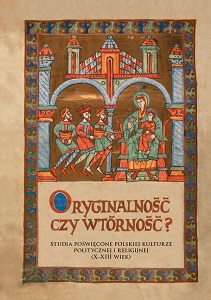Liturgiczne początki Polonii. Lokalna adaptacja chrześcijańskiego kultu a tworzenie „polskiej” tożsamości politycznej w X–XI w.
Liturgical origins of Polonia. The local appropriation of Christian worship and the formation of ‘Polish’ political identity (late 10th – late 11th century)
Author(s): Paweł Figurski
Subject(s): Middle Ages, 6th to 12th Centuries, 13th to 14th Centuries, 15th Century
Published by: Wydawnictwa Uniwersytetu Warszawskiego
Keywords: medieval history; church history; Christianity in the Middle Ages; religious culture; Poland during the Piast dynasty
Summary/Abstract: This article argues that the local appropriation of Christian liturgy in Polonia facilitated the early-medieval state formation of the first Piast realm. ‘Polish’ political identity was shaped by original liturgical phenomena by mostly two means. First, the hitherto unprecedented name of the territory, Polonia, was firstly attested in writing in the liturgical sequence Annua recolamus (Bamberg, Staatsbibliothek, Ms. Lit. 5, fol. 97v). The name was promoted mostly by sources used during Christian worship (the sequence mentioned above and St Adalbert hagiography). Second, liturgical phenomena interiorized the new identities of the political community and the kingship theology. For instance, the invocations of rulers’ names in the disputed territories, repetitive intercessions for monarchs, developed liturgy of war have been shaping and, subsequently, expressing the identities of the Piast dynasty and of those who participated in the Christian worship. Political liturgy functioned as the toolin the identification processes of the early-medieval Polonia.
- Page Range: 725-796
- Page Count: 72
- Publication Year: 2020
- Language: Czech, Polish
- Content File-PDF

